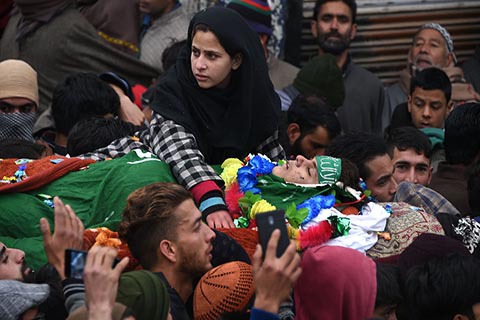250 militants, 144 civilians, 86 forces personnel killed
2018 was the bloodiest year in more than a decade in Kashmir as 250 militants, 144 civilians and 86 forces personnel were killed.
Among the deceased militants were 15 top commanders of various militant outfits such as Sadaam Paddar, Sameer Tiger, Altaf Kachroo, Towseef Sheikh and Umar Ganai. But the killing of Lashkar militant Naveed Jatt, who had escaped from police custody at the SMHS Hospital in February after killing two policemen escorting him for health check, was the major success for the forces.
A police officer said the fact that 250 militants were still active by mid November pointed to success of infiltration attempts and “silent recruitment” of local boys.
However, director general of police Dilbagh Singh said no new youth joined militancy since October this year.
“Recruitment has gone down, stone pelting incidents too are down and there is a lot of improvement in law and order situation. We will see a better tomorrow,” he said.
Asked whether militancy would be wiped out from Kashmir given the pace at which forces are killing militants, a police officer said: “As long as infiltration continues, militancy can’t be done away with. Also, killing militants is no solution and ultimately political handle is highly inevitable for the long lasting peace in the region.”
Almost similar statement was echoed by the general officer commanding (GoC) of Srinagar-based 15 Corps, Lieutenant General AK Bhat, who stated that the military can only create conditions of normalcy. “Beyond that, the initiatives have to be at levels of good governance, politically talking to people. During the Vajpayee era, it has happened, and similar initiatives the government will take at the right moment. I am sure they will,” Bhat told a newspaper in an interview. He said one of the main things was to find the methods and means to convince the youth that the path of violence will not deliver anything.
“And second, more importantly, is to work in the psychological space with the populace of Kashmir, to tell them that their future is far better in India than in Pakistan… that they are only being used as tools by the Jama’at, by the separatists and Pakistan,” he said. “Army’s role is to ensure that peace is maintained. Of course long-term solutions, the government have to look at them.
© Greater Kashmir

